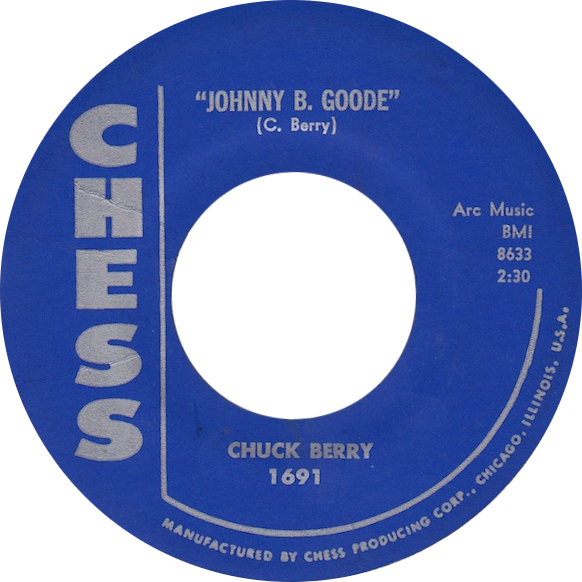"Johnny B. Goode" is a 1958 rock song written and first recorded by Chuck Berry. Released as a single, it peaked at number two on Billboard magazine's Hot R&B Sides chart and number eight on its pre-Hot 100 chart.
"Johnny B. Goode" is considered one of the most recognizable songs in the history of popular music. Credited as "the first rock & roll hit about rock & roll stardom", it has been recorded by many other artists and has received several honors and accolades, including being ranked seventh on Rolling Stone's list of the "500 Greatest Songs of All Time" and included as one of the 27 songs on the Voyager Golden Record, a collection of music, images, and sounds designed to serve as a record of humanity.
Composition and recording
Written by Berry in 1955, the song is about a semi-literate "country boy" from the New Orleans area, who plays a guitar "just like ringing a bell", and who might one day have his "name in lights". Berry acknowledged that the song is partly autobiographical and that the original lyrics referred to Johnny as a "colored boy", but he changed it to "country boy" to ensure radio play. As well as suggesting that the guitar player is good, the title hints at autobiographic elements, because Berry was born at 2520 Goode Avenue, in St. Louis.
The song was initially inspired by Johnnie Johnson, the regular piano player in Berry's band, but developed into a song mainly about Berry himself. Johnson played on many recordings by Berry, but for the Chess recording session Lafayette Leake played the piano, along with Willie Dixon on bass and Fred Below on drums. The session was produced by Leonard and Phil Chess.
Legacy
In The Guardian, Joe Queenan wrote that "Johnny B. Goode" is "probably the first song ever written about how much money a musician could make by playing the guitar", and argued that "no song in the history of rock'n'roll more jubilantly celebrates the downmarket socioeconomic roots of the genre". In Billboard, Jason Lipshutz stated that the song was "the first rock-star origin story", and that it featured "a swagger and showmanship that had not yet invaded radio."
When Chuck Berry was inducted during the first Rock and Roll Hall of Fame induction ceremony on January 23, 1986, he performed "Johnny B. Goode" and "Rock and Roll Music", backed by Bruce Springsteen and the E Street Band. The Hall of Fame included these songs and "Maybellene" in their list of the 500 songs that shaped rock and roll. It was inducted into the Grammy Hall of Fame in 1999, for its influence as a rock and roll single.
"Johnny B. Goode" has been recorded by a wide variety of artists in different genres. In 1969, country musician Buck Owens's version topped Billboard magazine's Hot Country Sides chart. In 1972, Jimi Hendrix had a posthumous hit with a live version, which peaked at number 35 on the UK Singles Chart. and number 13 on the New Zealand Top 50 in 1986. Peter Tosh's rendition peaked at number 84 on the Billboard Hot 100, number 48 on the UK Singles Chart, number 10 in the Netherlands, and number 29 in New Zealand in 1983. In 1988, Judas Priest's version reached number 64 on the UK Singles Chart. The Sex Pistols also covered it for their soundtrack The Great Rock 'n' Roll Swindle in 1979.
The song is included, as the eleventh track of disc 1, in the Voyager Golden Record, travelling into deep space outside the solar system.
| List | Publisher | Rank | Year of publication |
|---|---|---|---|
| 500 Greatest Songs of All Time | Rolling Stone | 7 | 2004 |
| 100 Greatest Guitar Tracks | Q | 42 | 2005 |
| 100 Greatest Guitar Songs of All Time | Rolling Stone | 1 | 2008 |
| Top 10,000 Songs | Acclaimed Music | 5 | N/A |
| 500 Songs That Shaped Rock | Rock and Roll Hall of Fame | N/A | 1995 |
| 50 Greatest Guitar Solos | Guitar World | 12 | 2009 |




Sem comentários:
Enviar um comentário